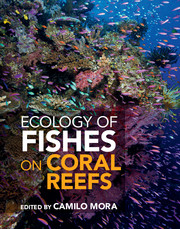Book contents
- Frontmatter
- Contents
- Preface
- Foreword
- List of contributors
- PART I BASIC ECOLOGY
- PART II PATTERNS AND PROCESSES
- PART III HUMAN FINGERPRINTS
- 13 Effects of climate change on coral reef fishes
- 14 Effects of fishing on the fishes and habitat of coral reefs
- 15 Effects of sedimentation, eutrophication, and chemical pollution on coral reef fishes
- 16 Impacts of invasive species on coral reef fishes
- 17 Cashing in on coral reefs: the implications of exporting reef fishes
- PART IV CONSERVATION
- PART V DEBATES AND PARADIGM SHIFTS
- References
- Index
13 - Effects of climate change on coral reef fishes
from PART III - HUMAN FINGERPRINTS
Published online by Cambridge University Press: 05 May 2015
- Frontmatter
- Contents
- Preface
- Foreword
- List of contributors
- PART I BASIC ECOLOGY
- PART II PATTERNS AND PROCESSES
- PART III HUMAN FINGERPRINTS
- 13 Effects of climate change on coral reef fishes
- 14 Effects of fishing on the fishes and habitat of coral reefs
- 15 Effects of sedimentation, eutrophication, and chemical pollution on coral reef fishes
- 16 Impacts of invasive species on coral reef fishes
- 17 Cashing in on coral reefs: the implications of exporting reef fishes
- PART IV CONSERVATION
- PART V DEBATES AND PARADIGM SHIFTS
- References
- Index
Summary
Climate change poses a major threat to coral reef ecosystems, and will affect coral reef fishes in three main ways. First and foremost, climate change is already contributing to widespread degradation of coral reef habitats, leading to declines in abundance and diversity of reef-associated fishes. Second, increasing temperatures will have direct effects on the individual condition and fitness of some coral reef fishes. Unless these species can adapt to changing temperature regimes, it is likely that they will persist in either a small portion of their current geographical extent or move poleward, invading new habitats and potentially displacing other fish species. The third effect relates to rising CO2 levels and ocean acidification, which could have significant physiological and behavioral effects on fishes towards the latter part of this century. It is unequivocal that climate change will affect reef fishes throughout this century. However, small-scale experimental studies, which are often focused on a single species and a single environmental factor, provide limited insight on expected changes in the biodiversity, productivity, and composition of reef fish assemblages. Future research will need to assess synergistic effects of different environmental variables on not only individual species, but also on biotic interactions and community dynamics, as well as exploring the adaptive capacity of species.
Global climate change has the capacity to greatly alter the biodiversity, function, and productivity of coral reef ecosystems [e.g. 1137]. Emerging effects of global climate change have so far been manifest mainly as increased incidence of mass bleaching and disease among scleractinian corals and other zooxanthellate organisms, which is directly contributing to widespread degradation of coral reef habitats [1192], and will be increasingly compounded by effects of ocean acidification [1139]. In the Indo-Pacific, extensive depletion of scleractinian corals and associated changes in the biological and physical structure of coral reef habitats has important effects on the structure and dynamics of local populations and communities of coral reef fishes [2023, 2027, 2707]. Consequently, climate change and ocean acidification will have significant indirect effects on coral reef fishes due to their effects on coral reef habitat.
- Type
- Chapter
- Information
- Ecology of Fishes on Coral Reefs , pp. 127 - 134Publisher: Cambridge University PressPrint publication year: 2015
- 11
- Cited by

